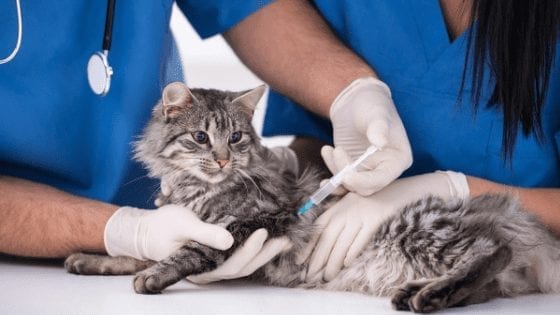Pets are your family’s best friends and as owners, we always want to ensure they are cared for well. We walk them and feed them, keeping them healthy and playful.
Our pets can’t tell us they are unwell, so it is our responsibility to constantly assess their health and act upon any abnormalities whenever they arise. Keeping vaccinations up-to-date is crucial in maintaining the safety of your animals and your family.
Vaccinations have helped to prevent the death of millions of animals. They are designed to prevent disease, in turn avoiding costly medical treatment. Vaccinations contain an agent which is similar to the microorganism that causes the primary disease for which they are being vaccinated for. Once the vaccine has been injected into the animal, the agent stimulates the animal’s immune system, allowing the body to recognise that it is a threat. In the future, should the animal encounter the same disease, the body will recognise it as a danger and the immune system will know how to fight against it.
There are two categories that pet vaccinations are divided by – core and non-core vaccines.
Core vaccines are the ones which every dog or cat must receive, no matter their age or environment. In Australia, the core vaccinations for dogs are canine distemper virus, canine adenovirus and canine parvovirus.
Non-core vaccines are those which are required based on the context in which the animal lives. For dogs, these are paraindluenze virus, bordetella bronchiseptica and leptospira interrogans. To find out the core and non-core vaccines for other pets, we recommend you visit your vet.
Commonly, if you have a puppy or a kitten, the first round of vaccinations is given to the pet when they are around six to eight weeks old. After this first vaccine, certain vaccines will need to be topped up yearly whereas others are effective for more than 12-months. Each animal is unique and we recommend that you take your pet to your vet to have a vaccination protocol prescribed. These vaccination protocols are catered to your pet’s specific needs and requirements.
There are some diseases that can be carried from animal to human. This further strengthens the argument that it is vital to get your pets vaccinated. Contracting rabies is the most common transferable pet to human disease. Rabies virus does not currently occur in land-dwelling animals in Australia but Australian bat lyssavirus (ABLV) does occur in bats in Australia, and can be transmitted from bats to humans and to other animals. Only three cases of human infection with ABLV have been recorded since the virus was first identified in 1996. Rabies almost always leads to the euthanasia of an animal and neurological problems are common in both animals and people. Although Australia is considered to be rabies-free, it still affects many countries in the world where the vaccine is considered ‘core’, like in the United States. Luckily, this is not the case in Australia, so the vaccine is not necessary unless your dog is planning a trip overseas.
We want the best for our pets and nothing is worse than watching them go through any type of pain. Ensuring that your pets’ vaccinations are up-to-date will help them live healthy, happy, long lives.
If you would like more information about our services, please feel free to contact us.


